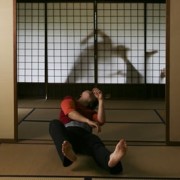Roko Kawai
Roko is a dancer/choreographer who often works in collaboration with other artists. A Japanese-American immigrant, she has lived in Philadelphia for over twenty years. Roko is a classical dance trainee, a contemporary artist, and a survivor whose work explores her personal body politics and specific life history. Her life and work have been touched by domestic violence and loss. By working through this complex lens, she hopes her experience and her art will give courage and clarity to others. She has created, performed, and toured many works, both independently and in collaboration with local and international artists. Her work has been presented in a range of venues, including an adult literacy center and a women's prison. Daughter Tongue, her solo show which premiered in 1994, is about growing up as an immigrant child, struggling to learn both Japanese and English in the face of racism during the 1970s, and the pressure she received from her well-meaning but demeaning parents. Since 2000, Roko has been training primarily in Japanese classical dance in an effort to understand her relationship to Japanese culture and traditions. Through organizing educational and performance workshops, Roko seeks to help her audiences understand her experimental work as it relates to Japanese classical dance. In addition, Roko has worked as a teaching artist in a diverse range of schools and organizations. She takes special pleasure in mentoring immigrant and Asian American artists who may not receive recognition for their work within their families.
Awarded Grants
2008
Leeway Transformation Award (LTA)
Overview
Roko is a dancer/choreographer who often works in collaboration with other artists. A Japanese-American immigrant, she has lived in Philadelphia for over twenty years. Roko is a classical dance trainee, a contemporary artist, and a survivor whose work explores her personal body politics and specific life history. Her life and work have been touched by domestic violence and loss. By working through this complex lens, she hopes her experience and her art will give courage and clarity to others. She has created, performed, and toured many works, both independently and in collaboration with local and international artists. Her work has been presented in a range of venues, including an adult literacy center and a women's prison. Daughter Tongue, her solo show which premiered in 1994, is about growing up as an immigrant child, struggling to learn both Japanese and English in the face of racism during the 1970s, and the pressure she received from her well-meaning but demeaning parents. Since 2000, Roko has been training primarily in Japanese classical dance in an effort to understand her relationship to Japanese culture and traditions. Through organizing educational and performance workshops, Roko seeks to help her audiences understand her experimental work as it relates to Japanese classical dance. In addition, Roko has worked as a teaching artist in a diverse range of schools and organizations. She takes special pleasure in mentoring immigrant and Asian American artists who may not receive recognition for their work within their families.
2004
Window of Opportunity Grant (WOO)
Overview
Japanese Classical Dance performance along with master dancer and teacher Hanayagi Kazu's Wa no Kai (community of apprentices), providing opportunity to experiment with movement and perform in a full production at the National Theater in Tokyo. Support for performance costs.
2002
Window of Opportunity Grant (WOO)
Overview
Performance of new work and classical Japanese dance as a part of the Painted Bride's Open Access program. Support towards performance/artist fees, production costs and travel expenses.
1999
Window of Opportunity Grant (WOO)
Overview
Support for travel and materials related to advanced study in dance/body movement in Los Angeles & San Francisco, July-August 1999.



